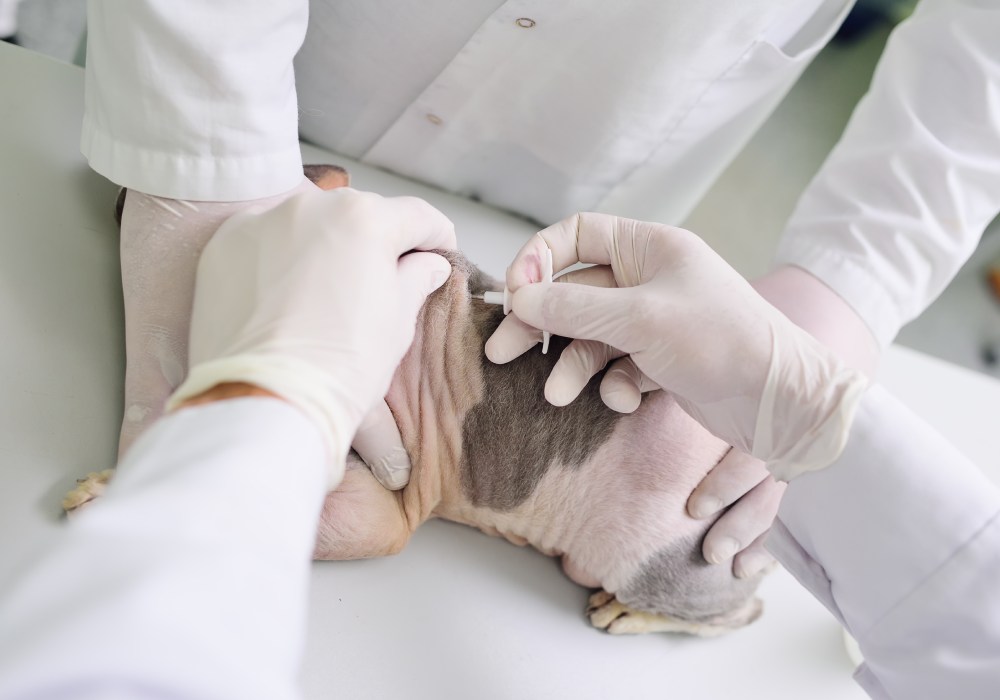Services
Pet Microchipping & Identification Services in Omaha
Keeping their pets safe should be a top priority of every owner. Taking on a pet means protecting it from harm. At Lone Tree Animal Care Center in Omaha, NE, our knowledgeable staff understand how important this is to you. That’s why we offer microchipping as one of our many services. It’s one of the most valuable defenses pet owners have if their beloved pet gets lost.
What Happens When My Pet Gets Microchipped?
When a pet is “chipped”, a tiny scannable chip is placed under the skin near the shoulder blades. The chip will have a number that goes into a database with your pet’s name and your information. You can also add other personal data that you believe may be important. Should your pet get lost, it can be scanned by any veterinarian hospital or at an animal shelter. Just like that, you and your buddy can be reunited.
Another useful aspect to microchipping is to prove your pet belongs to you. Sadly, animals, like children, can be the subject of ugly custody disputes when partners or friends end a relationship. If your pet also gets lost, other people might try to claim him or her
Is It Painful for My Pet to Be Microchipped?
The chipping process causes only minor discomfort. The chip is inserted via syringe. It’s no worse than your pet receiving a vaccine.
Can a Microchip Actually Help Me Get My Pet Back?
Yes. The chip can be successful in reuniting you with your pet. The chip does not act as a tracking device, but if someone else finds your pet, they will have the tools available to them to be able to get your pet back to you should you ever lose them
Sadly, some chipped pets are not brought back to their families because the phone number provided is not up to date. Always remember to update the database if your phone and address changes.
Visit Us for More Information
Microchipping your pet is safe and easy. If you’re in the Omaha, NE area, we at Lone Tree Animal Care Center are happy to answer any questions and help you keep your four-legged friend safe and sound. Call us at (402) 389-3356 to speak to a veterinarian specialist.
Microchipping FAQs
Microchipping is a topic that pet owners often have questions about. Misconceptions about microchipping could keep you from benefiting from all that this service has to offer. Dr. Emily and our team at Lone Tree Animal Care Center have gathered some of the questions that we run into regarding pet microchipping. If you live in or around Omaha and are considering microchipping your cat or dog, contact Lone Tree Animal Care Center.
What is a microchip?
A microchip is a tiny, electronic chip that is embedded under your pet’s skin to help identify it in the event it gets lost. This chip contains an I.D. number for your pet which is registered with your contact information in a national pet registry. Microchips are activated by special scanners which most veterinarians and animal shelters possess. If your pet is lost and taken to a veterinarian’s office or animal shelter, it will be scanned for a chip. The I.D. number on the chip will be matched with your information in the registry so that you can be contacted.
How are microchips implanted into pets?
Our veterinarian will inject the microchip under your pet’s skin using a hypodermic needle. The process is quick, virtually painless, and requires no anesthetics or surgery. Microchipping can be done during an annual pet exam at our clinic or at the same time as your pet’s spay or neuter surgery.
Can a microchip help me track my lost pet?
Microchips are not GPS devices and cannot be used for tracking the location of your pet in real-time. They can, however, help you be reunited with your lost pet by providing veterinarians and animal shelters with your contact information so they can call you when your pet is found.
Can microchipping my pet compromise my privacy?
Your contact details will only be used by the veterinarian or animal shelter that has your lost pet to inform you it has been found. You will choose what information you want to be placed in the pet registry and security measures are in place to prevent random people from obtaining that information. If you move or your contact details change, be sure to update this information in the pet registry to ensure you can be reached if your pet is found.
Does microchipping replace dog tags and collars?
Microchipping shouldn’t be a replacement for dog tags and collars, since these items are important for pets. Microchipping can, however, add an extra layer of protection to help retrieve your pet in the event it gets lost or stolen.
